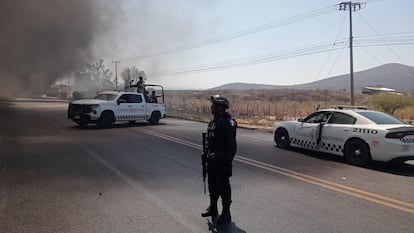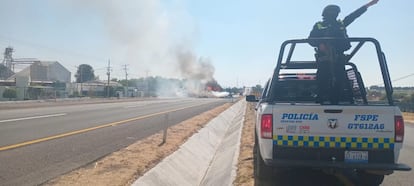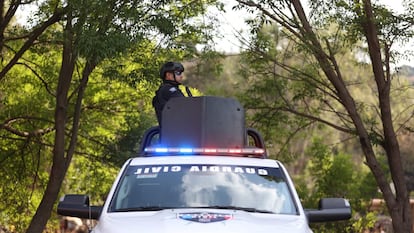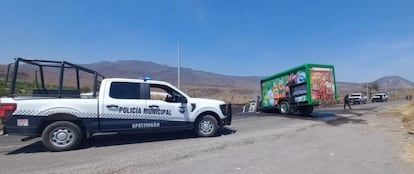Four hours under fire from the Jalisco New Generation Cartel: ‘We’re going to have a party’
El Mencho ordered trailers to be set alight and highways blocked in Michoacán, Jalisco, and Guanajuato. Two police officers were killed, but no arrests were made: ‘We’ve never seen blockades of this scale’


The first vehicle burst into flames around 2 p.m. on Wednesday. It was a truck from a delivery company.
“At first, they said it was an electrical circuit failure, but then it became clear we were in the midst of a narco blockade because of the other vehicles [that caught fire],” says the advisor to the Human Security Observatory of Apatzingán, in the Mexican state of Michoacán, who asks to remain anonymous. This is protocol in a country where it’s become routine for cartels to take to the streets, set cars on fire, and lay siege to entire towns to send a message to the state.
The news began to spread by word of mouth, cell phone to cell phone, neighbor to neighbor. “The dismantling of the rule of law has led people to seek preventive security measures, and WhatsApp groups are one of the most effective,” says the advisor.
The violence started in Apatzingán, but spread beyond the Mexican city. The Jalisco New Generation Cartel (CJNG) aimed to demonstrate its power through fire, setting ablaze highways across more than 30 municipalities in three states. The worst-hit areas were the roads of 26 towns in Michoacán, but the violence of CJNG leader Nemesio “El Mencho” Oseguera also spread to two towns in Guanajuato and another in Jalisco.
Voice notes circulating on WhatsApp, with those gray letters at the top indicating when a message has been forwarded multiple times: “Get away folks, everyone who’s heading out to the road right now, they’re burning cars. Quiroga, Zacapu, Apatzingán, Uruapan, Tlazazalca, in 10 municipalities, they’re burning cars. Cars, trucks, buses — everything, everything. There’s no authority,” says one voice note.
Another warns: “Turn around, they’re shooting at each other, it’s a clash between hitmen, the National Guard, and Sedena [Mexico’s Defense Ministry].”
While a son urges: “Turn around, Dad, there’s a shooting.”
The advisor from Apatzingán, who doesn’t want to give his name, went to a grocery store just before nightfall. “The owner was telling me that the guy who supplies him with limes was really scared because he thought they were going to take his truck.”
The streets had emptied, and people took refuge in their homes. “This has happened several times, and normally there’s fear, falling back, hiding, not going out, not moving around, being very cautious, not talking about the issue. The town goes silent from one moment to the next. Yesterday, we didn’t gather together; we don’t have the capacity or the will to be martyrs.”

It was an old and familiar terror, but that doesn’t make it any less terrifying.
“It was a reminiscence of times we thought were relatively over. We’re going backwards in terms of the security conditions we had tried to build over the last few years as a society. We’ve never seen blockades on this scale,” says the anonymous source from Apatzingán.
Alongside videos of burning trucks, photographs of collapsed highways, and voice note warning, other information began to circulate. Among security personnel, different prosecutors’ offices, reporters, and analysts, speculation arose: what had led El Mencho to order such an attack?
The official version
That same Wednesday morning, there was a military operation that included an armed helicopter opening fire on “some groups entrenched in the hills,” according to the advisor from the Human Security Observatory of Apatzingán. It was rumored that the Navy had raided Ocotlán, in the Jalisco region bordering Michoacán, to arrest a high-ranking drug lord. Some even claimed that they had captured him, and that El Mencho unleashed all his firepower to secure his release.
This was discussed by local reporters and also mentioned off the record, as a fait accompli, by government agents. More than one comparison was made with the 2019 Culiacanazo, when the Sinaloa Cartel set Culiacán on fire to force then-Mexican president Andrés Manuel López Obrador to release Ovidio Guzmán, the son of Joaquín Guzmán “El Chapo” Loera — a goal they initially achieved.
This was also reported to EL PAÍS by sources with knowledge of the operation. The Michoacán Public Security Secretariat was brief but confirmed that “road blockades caused by criminal groups in response to security operations” had occurred. Mexico’s Security Cabinet issued its daily report listing “significant actions” of the day. There were information on seizures and arrests in a dozen states. But there was no mention of the narco blockades in Michoacán, Jalisco, and Guanajuato.
The governors of Michoacán, Jalisco, and Guanajuato kept silent, as did Mexican President Claudia Sheinbaum, and her security czar, Omar García Harfuch — until Thursday. That morning, the two presented their official version: “The attacks are the result of conflicts between two criminal groups fighting over territories.”

There were four hours of blockades in 30 municipalities across three different states. Two police officers died in clashes with the gunmen. Dozens of vehicles burned in makeshift barricades on federal highways. A couple of stores were also set on fire in Apatzingán. No one was officially arrested, despite the scale of the attack. And the official version spoke, as it has so often before, of criminals fighting over territory.
Residents of the affected municipalities were skeptical about this version of events, to say the least.
“It was common for these narco blockades to happen, especially to exert pressure on the authorities whenever a member of the organized crime was arrested. It happened with El Chango Méndez [from La Familia Michoacana] and other drug lords from another era,” recalls the Apatzingán Observatory advisor.
And even if he believed the official version, he adds: “It’s worrying that they now acknowledge that the territory is being chronically disputed between criminal groups without the state putting a stop to it.”
David Saucedo, an expert security analyst, agrees: “Omar García Harfuch’s version is implausible. It doesn’t make sense to me. Two rival groups never attack each other with narco blockades; they usually use them to pressure authorities if their members are arrested, as in the Culiacanazo.”
In 2022, the Mexican Army tried to capture Ricardo “El Doble R” Ruiz, El Mencho’s right-hand man, and Gerardo “El Apá” González. The military failed to arrest him, and in response, the CJNG unleashed chaos very similar to this week’s.
“It doesn’t seem like a conflict between groups,” says Saucedo. “It points to a failed operation to capture someone. And only a regional leader would generate simultaneous narco blockades in three states. It makes sense to me that it would be El Doble R, because he’s the boss in those areas.”
By 6:00 p.m. on Wednesday, the worst was over. The fires were being extinguished, and traffic was returning to the roads.
“The local authorities boast that the roads were cleared as a success, but it’s a defeat; they didn’t arrest anyone,” says Saucedo.
The cartel used the “narco terrorism” playbook, he notes, with the complicity of local governments. It’s not possible, the analyst argues, for a criminal group to sustain hours of terror in so many places simultaneously without suffering a single arrest. Saucedo explains that the usual modus operandi in these cases is for the drug lords to warn the police with a coded message: “We’re going to have a party.” The agents pull back, and the gunmen run riot.
“Criminal feudalism”
There are now concerns about future violence. “There will be acts of retaliation against the federal government,” says Saucedo.
The uncertainty lies in how the CJNG will respond, as it has been simmering for weeks due to the renewed offensive the Mexican government has launched against it.
“We wouldn’t want an outbreak like those we’ve experienced in other eras,” says the advisor from the Apatzingán Observatory. “We’ve already seen self-defense groups here that didn’t achieve their objective. There is definitely social unrest that isn’t being addressed, and it is worsening because all the authorities’ statements are unsatisfactory. People find it humiliating to be told things are fine when it’s clear they aren’t.”

It’s no longer just about Wednesday’s road blockades: “Landmines in rural areas, drones with explosives, so-called criminal governance, which we call criminal feudalism — governance is too big a word for them,” adds the advisor. “It’s the appropriation of lives and property by warlords who impose their order. I don’t think the state lacks capacity; what’s missing is interest.”
Meanwhile, the consequences have already led to an “economic recession,” says the Apatzingán resident: closed businesses, farmers unable to reach their fields, strikes by lime and avocado workers. There have also been other outbreaks of violence, taking advantage of the chaos created by the blockades.
“Yesterday, a person working in a workshop was murdered,” he continues. “Hitmen arrived to kill him point-blank. We don’t believe it’s directly related [to the narco blockades], but when these events occur, it facilitates the commission of other crimes because the waters are completely muddied.”
Saucedo concludes: “It’s not a conflict between drug traffickers. For me, it’s an excuse. They tried to capture a drug trafficker, he escaped, and the reaction caused panic in three states. They were left empty-handed and embarrassed.”
Sign up for our weekly newsletter to get more English-language news coverage from EL PAÍS USA Edition
Tu suscripción se está usando en otro dispositivo
¿Quieres añadir otro usuario a tu suscripción?
Si continúas leyendo en este dispositivo, no se podrá leer en el otro.
FlechaTu suscripción se está usando en otro dispositivo y solo puedes acceder a EL PAÍS desde un dispositivo a la vez.
Si quieres compartir tu cuenta, cambia tu suscripción a la modalidad Premium, así podrás añadir otro usuario. Cada uno accederá con su propia cuenta de email, lo que os permitirá personalizar vuestra experiencia en EL PAÍS.
¿Tienes una suscripción de empresa? Accede aquí para contratar más cuentas.
En el caso de no saber quién está usando tu cuenta, te recomendamos cambiar tu contraseña aquí.
Si decides continuar compartiendo tu cuenta, este mensaje se mostrará en tu dispositivo y en el de la otra persona que está usando tu cuenta de forma indefinida, afectando a tu experiencia de lectura. Puedes consultar aquí los términos y condiciones de la suscripción digital.








































